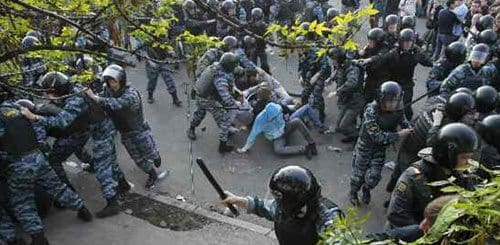One year after Vladimir Putin's third inauguration as Russia's President, the rights to freedom of expression, association and assembly have come under increasing attack, despite the fact that these rights are explicitly guaranteed by the Russian Constitution and international human rights treaties to which Russia is party.
At least two new laws have been introduced and eleven (five Federal and six regional) laws have been amended including broad provisions that allow for arbitrary interference with the rights to freedom of expression, association, and assembly despite legally binding decisions of regional and universal human rights bodies in this regard. As a result, the space for political opposition and other forms of dissent is rapidly shrinking, as well as for operations of non-governmental organizations, in particular those reliant on overseas funding. These recent legal initiatives have the declared aim of ensuring public order and the protection of the rights of citizens. Their effect has been the opposite: prominent government critics, opposition voices, watchdogs and ordinary individual protesters (on a wide range of issues) have all seen their rights restricted over the course of the last year.
The right to freedom of assembly has been restricted through excessively onerous approval procedures, sharply increased sentences, the imposition of additional responsibilities on organizers, and increased liability for the actions of participants. The few large scale protests that have been authorized cannot obscure the great many, both large and, mostly, very small, that have been arbitrarily banned or dispersed. New restrictions on the freedom of association and expression have had serious implications for civil society in the Russian Federation. Organizations in receipt of foreign funding are required to describe themselves as "foreign agents", if considered to be involved in undefined "political activities". This requirement is inconsistent with international human rights standards. A wave of inspections of NGOs across the country by prosecutors and tax officials in March and April 2013 appears to have set the grinding wheels of this law's application in motion.
The freedom of expression risks being further curtailed through new legislative initiatives such as the recriminalization of defamation, the new Treason law and draft legislation on blasphemy that is currently before the Duma.
This report analyses these legislative developments and documents several cases in which the rights to freedom of expression, association and assembly have been violated. The result is a long list of human rights violations that collectively testify to the shrinking of fundamental freedoms in Russia.

